<Back to Index>
- Pope Urban II, 1088-1099
- Pope Boniface VIII, 1294-1303
PAGE SPONSOR
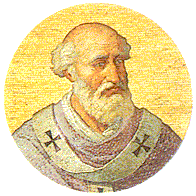
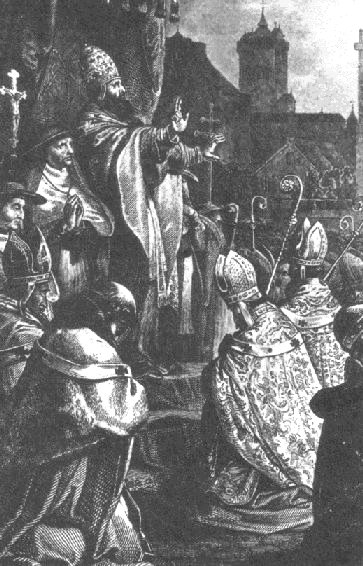
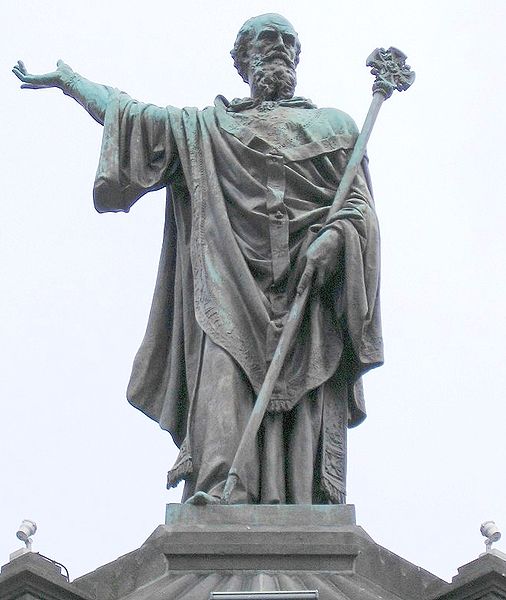
Pope Blessed Urban II (ca. 1035 – 29 July 1099), born Otho de Lagery (alternatively: Otto, Odo or Eudes), was Pope from 12 March 1088 until his death on 29 July 1099. He is best known for starting the First Crusade (1096 – 1099) and setting up the modern day Roman Curia in the manner of a royal court to help run the Church.
Pope Gregory VII named him cardinal - bishop of Ostia ca. 1080. He was one of the most prominent and active supporters of the Gregorian reforms, especially as legate in Germany in 1084 and was among the few whom Gregory VII nominated as possible successors to be Pope. Desiderius, abbot of Monte Cassino was first chosen Pope as Victor III when Gregory VII died in 1085, but after Victor's short reign, Otho was elected Pope Urban II by acclamation (March 1088) at a small meeting of cardinals and other prelates held in Terracina in March 1088. He took up the policies of Pope Gregory VII, and while pursuing them with determination, showed greater flexibility and diplomatic finesse. At the outset, he had to reckon with the presence of the powerful antipope Clement III in Rome, but a series of well attended synods held in Rome, Amalfi, Benevento, and Troia supported him in renewed declarations against simony, Investiture Controversy, clerical marriages, and continued opposition to Emperor Henry IV.
In accordance with this last policy, the marriage of the countess Matilda of Tuscany with Guelph of Bavaria was promoted; Prince Conrad of Italy was assisted in his rebellion against his father and crowned King of the Romans at Milan in 1093; and Henry IV's wife, the Empress (Adelaide), was encouraged in her charges of sexual coercion against her husband. In a protracted struggle with King Philip I of France, whom he had excommunicated for his adulterous marriage to Bertrade de Montfort, Urban II finally proved victorious.
Urban II exchanged much correspondence with Archbishop Anselm of Canterbury,
to whom he extended an order to come urgently to Rome just after the
Archbishop's first flight from England, and earlier gave his approval to
Anselm's work De Incarnatione Verbi (The Incarnation of the Word).
Urban II's crusading movement took its first public shape at the Council of Piacenza, where, in March 1095, Urban II received an ambassador from the Byzantine Emperor Alexios I Komnenos asking for help against Muslim Turks who had taken over most of formerly Byzantine Anatolia. A great council met, attended by numerous Italian, Burgundian, and French bishops in such vast numbers it had to be held in the open air outside the city. At the Council of Clermont held in November of the same year, Urban II's sermon proved highly effective, as he summoned the attending nobility and the people to wrest the Holy Land and the eastern churches generally from the control of the Seljuk Turks.
There exists no exact transcription of the speech that Urban delivered at the Council of Clermont on 27 November 1095. The five extant versions of the speech were written down quite a bit later, and they differ widely from one another. All versions of the speech except that by Fulcher of Chartres were probably influenced by the chronicle account of the First Crusade called the Gesta Francorum (dated c. 1102), which includes a version of it. Fulcher of Chartres was present at the Council, but his version of the speech was written c. 1100 - 1106; Robert the Monk may have been present, but his version dates from about 1106. The two remaining versions were written even later by authors who certainly did not witness the speech. The five versions of Urban's speech reflect much more clearly what later authors thought Urban II should have said to launch the First Crusade than what Urban II himself actually did say. As a better means of evaluating Urban's true motivations in calling for a crusade to the Holy Lands, there are four extant letters written by Pope Urban II himself: one to the Flemish (dated December 1095); one to the Bolognese (dated September 1096); one to Vallombrosa (dated October 1096); and one to the counts of Catalonia (dated either 1089 or 1096 – 1099). It is Urban II's own letters, rather than the paraphrased versions of his speech at Clermont, that reveal his actual thinking about crusading. Nevertheless, the versions of the speech have had a great influence on popular conceptions and misconceptions about the Crusades, so it is worth comparing the five composed speeches to Urban's actual words. Fulcher of Chartres has Urban say this:
I, or rather the Lord, beseech you as Christ's heralds to publish this everywhere and to perse all people of whatever rank, foot - soldiers and knights, poor and rich, to carry aid promptly to those Christians and to destroy that vile race from the lands of our friends. I say this to those who are present, it is meant also for those who are absent. Moreover, Christ commands it.
The chronicler Robert the Monk put this into the mouth of Urban II:
... this land which you inhabit, shut in on all sides by the seas and surrounded by the mountain peaks, is too narrow for your large population; nor does it abound in wealth; and it furnishes scarcely food enough for its cultivators. Hence it is that you murder one another, that you wage war, and that frequently you perish by mutual wounds. Let therefore hatred depart from among you, let your quarrels end, let wars cease, and let all dissensions and controversies slumber. Enter upon the road to the Holy Sepulchre; wrest that land from the wicked race, and subject it to yourselves ... God has conferred upon you above all nations great glory in arms. Accordingly undertake this journey for the remission of your sins, with the assurance of the imperishable glory of the Kingdom of Heaven.
Robert continued:
When Pope Urban had said these ... things in his urbane discourse, he so influenced to one purpose the desires of all who were present, that they cried out "It is the will of God! It is the will of God!". When the venerable Roman pontiff heard that, [he] said: "Most beloved brethren, today is manifest in you what the Lord says in the Gospel, 'Where two or three are gathered together in my name there am I in the midst of them.' Unless the Lord God had been present in your spirits, all of you would not have uttered the same cry. For, although the cry issued from numerous mouths, yet the origin of the cry was one. Therefore I say to you that God, who implanted this in your breasts, has drawn it forth from you. Let this then be your war - cry in combats, because this word is given to you by God. When an armed attack is made upon the enemy, let this one cry be raised by all the soldiers of God: It is the will of God! It is the will of God!"
Within Fulcher of Chartres account of pope Urban’s speech there was a promise of remission of sins for whoever took part in the crusade. However, this was probably in reference to the plenary indulgence attached to the crusade, and not to sacramental absolution.
All who die by the way, whether by land or by sea, or in battle against the pagans, shall have immediate remission of sins. This I grant them through the power of God with which I am invested. O what a disgrace if such a despised and base race, which worships demons, should conquer a people which has the faith of omnipotent God and is made glorious with the name of Christ! With what reproaches will the Lord overwhelm us if you do not aid those who, with us, profess the Christian religion! Let those who have been accustomed unjustly to wage private warfare against the faithful now go against the infidels and end with victory this war which should have been begun long ago. Let those who for a long time, have been robbers, now become knights. Let those who have been fighting against their brothers and relatives now fight in a proper way against the barbarians. Let those who have been serving as mercenaries for small pay now obtain the eternal reward. Let those who have been wearing themselves out in both body and soul now work for a double honor. Behold! on this side will be the sorrowful and poor, on that, the rich; on this side, the enemies of the Lord, on that, his friends. Let those who go not put off the journey, but rent their lands and collect money for their expenses; and as soon as winter is over and spring comes, let them eagerly set out on the way with God as their guide.
It is disputed whether the famous slogan "God wills it" or "It is the will of God" (deus vult in Latin, Dieu le veut in French) in fact was established as a rallying cry during the council. While Robert the Monk says so, it is also possible that the slogan was created as a catchy propaganda motto afterward.
Urban II's own letter to the Flemish confirms that he granted "remission of all their sins" to those undertaking a "military enterprise" to "liberate the eastern churches." One notable contrast with the speeches recorded by Robert the Monk, Guibert of Nogent and Baldric of Dolis the lesser emphasis on Jerusalem itself, which Urban only once mentions as his own focus of concern: in the letter to the Flemish he writes, "they [the Turks] have seized the Holy City of Christ, embellished by his passion and resurrection, and blasphemy to say --- have sold her and her churches into abominable slavery." In the letters to Bologna and Vallombrosa he refers to the crusaders' desire to set out for Jerusalem rather than to his own desire that Jerusalem be freed from Muslim rule. Urban II refers to liberating the church as a whole or the eastern churches generally rather than to reconquering Jerusalem itself. The phrases used are "churches of God in the eastern region" and "the eastern churches" (to the Flemish), "liberation of the Church" (to Bologna), "liberating Christianity [Lat. Christianitatis]" (to Vallombrosa), and "the Asian church" (to the Catalonian counts). Coincidentally or not, Fulcher of Chartres's version of Urban's speech makes no explicit reference to Jerusalem. Rather it more generally refers to aiding the crusaders' Christian "brothers of the eastern shore," and to their loss of Asia Minor to the Turks.
Urban II died on 29 July 1099, fourteen days after the fall of Jerusalem to the Crusaders, but before news of the event had reached Italy; his successor was Pope Paschal II.
Far more subtle than the Crusades, but far more successful over the long run, was Urban II's program of bringing Campania and Sicily firmly into the Catholic sphere after generations of control under the Byzantine Empire and the Aghlabid and Fatimid emirs. His agent in the Sicilian borderlands was the Norman ruler Roger I. In 1098, after a meeting at the Siege of Capua, Urban II bestowed extraordinary prerogatives on Roger, some of the very same rights that were being withheld from temporal sovereigns elsewhere in Europe. Roger was to be free to appoint bishops as a right ("lay investiture"), free to collect Church revenues and forward them to the papacy (always a lucrative middle position), and free to sit in judgment on ecclesiastical questions. Roger I was to be virtually a legate of the Pope within Sicily. In re - Christianizing Sicily, seats of new dioceses needed to be established, and the boundaries of sees established, with a church hierarchy re-established after centuries of Muslim domination.
Roger's consort Adelaide brought settlers from the valley of the Po River to colonize eastern Sicily. Roger as a secular ruler seemed a reliable ally, since he was merely a vassal of his kinsman the Count of Apulia, himself a vassal of Rome, so it seemed safe at the time for Urban to give him these extraordinary powers, which were later to lead to bitter confrontations with Roger I's Hohenstaufen heirs.
Pope Urban was beatified in 1881 by Pope Leo XIII with his feast day on 29 July.
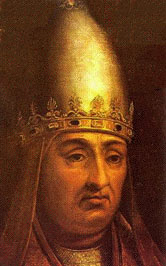
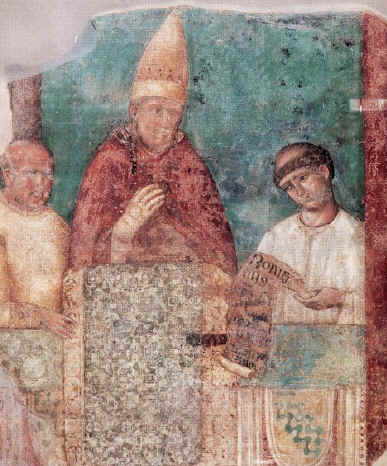
Pope Boniface VIII (c. 1235 – 11 October 1303), born Benedetto Gaetani, was Pope of the Catholic Church from 1294 to 1303. Today, he is probably best remembered for his feuds with Dante, who placed him in the Eighth Circle of Hell in his Divina Commedia among the simonists.
Gaetani was born in 1235 in Anagni, c. 50 kilometers southeast of Rome. He was the younger son of a minor noble family, the Gaetani. He took his first steps in the religious life when he was sent to the monastery of the Friars Minor in Velletri, where he was put under the care of his uncle Fra Leonardo Patrasso. He became a canon of the cathedral in Anagni in his teens. In 1252, when his uncle Pietro Gaetani became Bishop of Todi, in Umbria, Benedetto went with him and began his legal studies there. Benedetto never forgot his roots in Todi, later describing the city as "the dwelling place of his early youth," the city which "nourished him while still of tender years," and as a place where he "held lasting memories". In 1260, Benedetto acquired a canonry in Todi, as well as the small nearby castle of Sismano. Later in life he repeatedly expressed his gratitude to Anagni, Todi, and his family.
In 1264, Benedetto became part of the Roman Curia, where he served as secretary to Cardinal Simon de Brion, the future Pope Martin IV, on a mission to France. Similarly, he accompanied Cardinal Ottobuono Fieschi, the future Pope Adrian V, to England in 1265 – 1268 to suppress a rebellion by a group of barons against King Henry III of England.
Upon Benedetto's return from England, there is an eight year period in
which nothing is known about his life, after which Benedetto was sent to
France to supervise the collection of a tithe in 1276 and then became a papal notary in the late 1270s. During this time, Benedetto accumulated seventeen benefices that he was permitted to keep when he was promoted, first to cardinal deacon in 1281 and then ten years later to cardinal priest. As cardinal, he often served as papal legate in diplomatic negotiations to France, Naples, Sicily, and Aragon.
Pope Celestine V abdicated on 13 December 1294 at Naples, where he had established the papal court under the patronage of King Charles II of Sicily. There is a legend that Benedetto Gaetani was responsible for Celestine V's renunciation of the papacy by convincing him that no person on the earth could go through life without sin. A contemporary, Bartholomew of Lucca, who was present in Naples in December 1294 and witnessed many of the events of the abdication and election, said that Benedetto Gaetani was only one of several cardinals who pressured Celestine to resign. However, it is also on record that Celestine V resigned by his own design after consultation with experts, and that Benedetto merely showed that it was allowed by Church law. Either way, Celestine V vacated the throne and Benedetto Gaetani was elected in his place as pope, taking the name Boniface VIII. The conclave began on 23 December 1294, ten days after Celestine's resignation, in strict accordance with the rules established by Pope Gregory X at the Second Council of Lyons of 1274. Benedetto Gaetani was elected pope the next day, Christmas Eve, 24 December. On the first (secret) ballot, he had a majority of the votes, and at the accessio a sufficient number joined his majority to form the required two - thirds. He immediately returned the Papal Curia to Rome, where he was crowned at the Vatican Basilica on Sunday, 23 January 1295. One of his first acts as pontiff was to imprison his predecessor in the Castle of Fumone in Ferentino, where he died the next year at the age of 81, attended by two monks of his order. In 1300, Boniface VIII formalized the custom of the Roman Jubilee, which afterwards became a source of both profit and scandal to the church. Boniface VIII founded the University of Rome La Sapienza in 1303.
Boniface VIII put forward some of the strongest claims to temporal, as well as spiritual, power of any Pope and constantly involved himself with foreign affairs. In his Bull of 1302, Unam Sanctam, Boniface VIII proclaimed that it "is absolutely necessary for salvation that every human creature be subject to the Roman pontiff", pushing papal supremacy to its historical extreme. These views, and his chronic intervention in "temporal" affairs, led to many bitter quarrels with the Emperor Albert I of Habsburg, the powerful Colonna family of Rome, King Philip IV of France, and Dante Alighieri, who wrote his essay De Monarchia to dispute Boniface's claims of papal supremacy. The quarrel with the Colonnas culminated in Boniface VIII ordering the destruction in 1298 of their family city Palestrina after it surrendered peacefully under Boniface's assurances that it would be spared. Much of the city still boasted intact buildings and monuments from ancient Roman times, but Boniface razed it anyway, even spreading salt on the site as the Romans did in Carthage 1500 years before. Only the city's cathedral was spared.
In
the field of canon law Boniface VIII continues to have great influence.
He published his 88 legal dicta known as the "Regulae Iuris" in 1298. This
material must be well known and understood by canon lawyers or
canonists today to interpret and analyze the canons and other forms of
ecclesiastical law properly. The "Regulae Iuris" appear at the end of
the so-called Liber Sextus (in VI°), promulgated by Boniface VIII and now published as one of the five Decretals in the Corpus Iuris Canonici. Other systems of law also have their own "Regulae Iuris" even by the same name or something serving a similar function.
When King Frederick III of Sicily attained his throne after the death of Pedro III, Boniface tried to dissuade him from accepting the throne of Sicily. When Frederick persisted, Boniface laid excommunication on him, and an interdict upon the island of Sicily in 1296 that denied Catholic priests the right to conduct certain services there. Neither king nor people responded to this censure. The conflict continued until the Peace of Caltabellotta in 1302, which saw Pedro's son Frederick III recognized as the king of Sicily, while Charles II was recognized as the King of Naples. To prepare for a crusade, Boniface ordered Venice and Genoa to sign a truce; they fought each other for three more years, and turned down his offer to mediate peace.
Boniface also placed the city of Florence under an interdict and invited the ambitious French Count Charles of Valois to enter Italy in 1300 to end the feud of Black and White Guelphs, the poet Dante being
in the party of the Whites. Boniface's political ambitions directly
affected Dante when the pope, under the pretense of peacemaking, invited
Charles of Valois to intervene in the affairs of Florence. Charles's
intervention allowed the Black Guelphs to overthrow the ruling White Guelphs,
whose leaders, including the poet Dante, allegedly in Rome at the time
to argue Florence's case before Boniface, were sentenced to exile. Dante
settled his score with Boniface in Part One of the Divine Comedy, the Inferno,
by damning the pope even before his death in 1303 (the poet set the
time of the poem as being in the year 1300) in the pit of those whose
sin was simony. In the Inferno, Pope Nicholas III, who can see the future, mistakenly assumes that Dante is Boniface come before his time.
The conflict between Boniface VIII and King Philip IV of France came at a time of expanding nation states and the desire for the consolidation of power by the increasingly powerful monarchs. The increase in monarchical power and its conflicts with the Church of Rome were only exacerbated by the rise to power of Philip IV. In France, the process of centralizing royal power and developing a genuine national state began with the Capetian kings. During his reign, Philip surrounded himself with the best civil lawyers and decidedly expelled the clergy from all participation in the administration of the law. With the clergy beginning to be taxed in France and England to finance their ongoing wars against each other, Boniface took a hard stand against it. He saw the taxation as an assault on traditional clerical rights and ordered the bull Clericis laicos in February 1296, forbidding lay taxation of the clergy without prior papal approval. In the bull, Boniface states "they exact and demand from the same the half, tithe, or twentieth, or any other portion or proportion of their revenues or goods; and in many ways they try to bring them into slavery, and subject them to their authority. And also whatsoever emperors, kings, or princes, dukes, earls or barons... presume to take possession of things anywhere deposited in holy buildings... should incur sentence of excommunication." It was during the issuing of Clericis laicos that hostilities between Boniface and Philip began. Philip retaliated against the bull by denying the exportation of money from France to Rome, funds that the Church required to operate. Boniface had no choice but to contest Philip's demands, informing Philip that "God has set popes over kings and kingdoms."
Philip was convinced that the wealth of the Catholic Church in France should be used in part to support the state. He countered the papal bull by decreeing laws prohibiting the export of gold, silver, precious stones, or food from France to the Papal States. These measures had the effect of blocking a main source of papal revenue. Philip also banished from France the papal agents who were raising funds for a new crusade in the Middle East. In the bull Ineffabilis amor of September 1296, Boniface retreated. He sanctioned voluntary contributions from the clergy for the necessary defense of the state and gave the king the right to determine that necessity. Philip rescinded his ordinances regarding the exports and even accepted Boniface as arbitrator in a dispute between himself and King Edward I of England. Boniface decided most of those issues in Philip's favor.
Boniface proclaimed 1300 a "jubilee" year, the first in of many such jubilees take place in Rome.
He may have wanted to gather money from pilgrims to Rome as a
substitute for the missing money from France. The event was a success;
Rome had never received such crowds before. Boniface and his aides
managed the affair well, food was plentiful, and it was sold at moderate
prices controlled by the Vatican. It was an advantage to the pope that
the great sums of money he collected could be used according to
Boniface's own judgment. Despite half victories and many defeats,
Boniface was at the height of his reign.
The feud between Boniface and Philip IV reached its peak in the early 14th century, when Philip began to launch a strong anti - papal campaign against Boniface. A quarrel arose between Philip's aides and a papal legate, Bernard Saisset. The legate was arrested on a charge of inciting an insurrection, was tried and convicted by the royal court, and committed to the custody of the archbishop of Narbonne in 1301. In the bull Ausculta fili ("Listen, son", December 1301) Boniface VIII appealed to Philip IV to listen modestly to the Vicar of Christ as the spiritual monarch over all earthly kings. He protested the trial of churchmen before Philip's royal courts and the continued use of church funds for state purposes and he announced he would summon the bishops and abbots of France to take measures "for the preservation of the liberties of the Church". When the bull was presented to Philip, the Count of Artois, Robert II, reportedly snatched it from the hands of Boniface's emissary and flung it into the fire.
On February 1302, the bull Ausculta fili was officially burned at Paris before King Philip and a great multitude. To forestall the ecclesiastical council proposed by Boniface, Philip summoned the three estates of his realm to meet at Paris in April. At this first French States - General in history, all three classes - nobles, clergy, and commons - wrote separately to Rome in defense of the king and his temporal power. Some forty - five French prelates, despite Philip's prohibition, and the confiscation of their property, attended the council at Rome in October 1302.
From that council, on 18 November 1302, Boniface issued the bull Unam sanctam. It declared that both spiritual and temporal power were under the pope's jurisdiction, and that kings were subordinate to the power of the Roman pontiff. In response, Guillaume de Nogaret, Philip's chief minister, denounced Boniface as a heretical criminal to the French clergy. In 1303, Philip and Nogaret were excommunicated. However, on 7 September 1303, an army led by Nogaret and Sciarra Colonna surprised Boniface at his retreat in Anagni. The King and the Colonnas demanded his resignation; Boniface VIII responded that he would "sooner die". In response, Colonna allegedly slapped Boniface, a "slap" historically remembered as the schiaffio di Anagni ("Anagni slap").
Boniface
was beaten badly and nearly executed, but was released from captivity
after three days. He died of kidney stones and humiliation on 11 October 1303. There were rumors he had died of suicide from "gnawing through his own arm" and bashing his skull into a wall.
After the papacy had been removed to Avignon in 1309, Pope Clement V consented to a post - mortem trial by an ecclesiastical consistory at Groseau, near Avignon, which held preliminary examinations in August and September 1310.
A process (judicial investigation) against the memory of Boniface was held and collected testimonies that alleged many heretical opinions of Boniface VIII. This included the offense of sodomy, although there is little substantive evidence for this, and it is more likely that this was the standard accusation Philip made against enemies.
Before the actual trial could be held, Clement persuaded Philip to leave the question of Boniface's guilt to the Council of Vienne,
which met in 1311. When the council met, three cardinals appeared
before it and testified to the orthodoxy and morality of the dead pope.
Two knights, as challengers, threw down their gauntlets to maintain his
innocence by wager of battle. No one accepted the challenge, and the Council declared the matter closed.
The body of Boniface VIII was buried in 1303 in a special chapel that also housed the remains of Pope Boniface IV. Boniface VIII had arranged that this would be done to offset the fact that his predecessor was still alive, which caused him to worry that the legitimacy of his own papacy would be thrown into doubt. In choosing such a burial, Boniface VIII was trying to show that he was a legitimate pope with the implicit support from the grave of a popular predecessor, Boniface IV.
The body was exhumed in 1606, the results recorded by Giacomo Grimaldi. The body lay within three coffins, the outermost of wood, the middle of lead, and the innermost of pine. The corporal remains were described as being "unusually tall" measuring seven palms when examined by doctors. The body wore ecclesiastical vestments common for Boniface's lifetime: long stockings covered legs and thighs, and it was garbed also with the maniple, soutain, and pontifical habit made of black silk, as well as stole, chasuble, rings, and bejeweled gloves.
After
this exhumation and examination, Boniface's body was moved to the
Chapels of Pope Gregory and Andrew. It is now located in the grottoes.
- In his Inferno, Dante portrayed Boniface VIII as destined for hell, where simony is punished, although Boniface was still alive at the fictional date of the poem's story. Boniface's eventual destiny is revealed to Dante by Pope Nicholas III, whom he meets. A bit later in the Inferno, we are reminded of the pontiff's feud with the Colonna family, which led him to demolish the city of Palestrina, killing 6,000 citizens and destroying both the home of Julius Caesar and a shrine to the Blessed Virgin Mary. Boniface's ultimate fate is confirmed by Beatrice when Dante visits Heaven. It is notable that he does not adopt Guillaume de Nogaret's aspersion that Boniface VIII was a 'sodomite', however, and does not assign him to that circle of hell (albeit that Simony was placed in the eighth circle of Fraud below Sodomy in the seventh circle of Violence, designating it as a worse offense and taking precedence above activities of sodomy).
- He is also referenced in François Rabelais's Gargantua and Pantagruel. In the chapter where Epistemon is listing the inhabitants of hell and their occupations, he says that Boniface was (in one translation) "skimming the scum off soup pots".
- Mathematician and astronomer Giovanni Campano served as personal physician to Pope Boniface VIII.
- In Boccaccio's Decameron, Boniface VIII is satirically depicted granting a highwayman (Ghino di Tacco) a priorate (Day 10, second tale). Earlier (I.i), Boniface VIII is also mentioned for his role in sending Charles of Valois to Florence in 1300 to end the feud between the Black and White Guelphs.
- Boniface was a patron of Giotto di Bondone.
- Boniface had the churches of Rome restored for the Great Jubilee of 1300, particularly St. Peter's Basilica, the Basilica of St. John Lateran, and the Saint Mary Major Basilica.